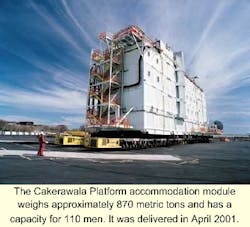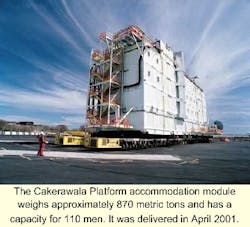ACCOMMODATION MODULES: Cakerawala platform rolled out for Gulf of Thailand field
Improved accommodation modules are becoming the norm in new offshore construction, regardless of the structure's final field location. The major oil companies now require North Sea standards in accommodation struc-tures for all new construction. Many things are driving this move including more trans-global movement of personnel and the desire to make offshore work more appealing. This improvement is in the interest best of the employees and also the companies, who are finding it harder to attract and keep offshore personnel.
Attracting workers
Demographic changes (i.e. aging workforce) and the need to attract more young people to offshore jobs is forcing companies to review the quality of life issues in new accommodations. They are finding that the cost of building better living modules is modest compared to the cost of attracting and keeping personnel.
Due to trimmed staffs the companies are moving their engineering professionals around the world more to make the best use of their skills. This is driving oil companies to create a better, more uniform living experience for their essential personnel so that they can both attract and keep them despite their being separated from their family and homes.
80% share of modules
Emtunga has 25 years experience of specialty construction for the offshore oil sector. High quality materials, control systems, and ventilation are essential elements that go into all its construction. To date, it has received five of the six largest orders for accommodation modules needed by the offshore oil industry during the last 12 months. These include Cakerawala in Thailand, West Seno in Indonesia as well as Ringhorne in the North Sea.
Recently Emtunga delivered the accommodation module for the Cakerawala platform for operator CTOC. The module was lifted into place on the platform, which is located in the Gulf of Thailand on the border between Thailand and Malaysia. The module weighs approximately 870 tons. Dimensions are 51 meters by 14.3 meters by 21.5 meters. The structure was an EPC (engineer, procure, construct) contract by Emtunga for Samsung Heavy Industries and was delivered in April 2001.
Double cabins are becoming the norm with 110-130 man capacity and weights of 1,000-1,200 tons being the most recent demand range. These are constructed in modular fashion with individual rooms built and prepared separately. The completed units are welded together into a larger module and the full module is then fitted with necessary plumbing, wiring, and ventilation systems to transform it into a completed living quarters. The fully assembled module is then transported to the field location and lifted into place.
Long life requirements
The normal life span of offshore structures is 30-40 years, while ship units are generally designed for 15 years. The longer life span expected of oil accommodation modules requires tighter controls on construction and the best of materials. Most shipyards do not have the capacity to design to such standards, nor do they have the skilled workers available to transform the specifications into functional modules.
The company utilizes stressed-skin construction with corrugated walls which allow load carrying in all dimensions. This allows for lower weight units compared to the frame and heavy plate construction traditionally seen from shipyards. Building stressed-skin modules requires not only construction experience, but the ability to design the structures for optimal use of materials. Emtunga has the necessary computer power, software, and experience to create the module required for any production platform.
Future work
The company has a full order book going into 2002, and is also bidding several other major projects. OKIOC (Offshore Kazakhstan International Operating Co.) is planning a development for the northern part of the Caspian Sea. Due to the shallow nature of the sea (1-6 meters water depth), OKIOC will likely use a man-made island and place the accommodations on a barge which could be floated to the location and set in the island. This construction will be especially challenging. Elsewhere in the Caspian Sea, AIOC (Azerbaijan Inter-national Oil Co.) is tendering for an accommodation unit for Chirag Field off Azerbaijan. That award will likely be let by the time this is published.
The accommodation module for the Spar for Devil's Tower Field, operated by Dominion Exploration in the Gulf of Mexico, will also be awarded shortly.
Steel vs. aluminum
While most modules use steel, some structures require lighter aluminum to be used. This usually occurs where deckload is critical. One such structure is Kizomba Field off Angola operated by Sonangol. This development is to be a Spar plus FPSO, and deckload is a major concern. Two accommodation modules will be needed, one for the Spar and one for the FPSO. The Spar is to service 110 workers, while the FPSO will accommodate 130 workers.
While design costs usually run around 15% of a project's cost, material costs are significant. Aluminum only saves 100 kg per square meter, compared with Emtunga's lightweight steel system but more when compared with conventional steel construction techniques. However, Emtunga can work to specifications with either material.
For more information contact Klas Wallin, Emtunga division of Pharmadule Emtunga. Tel: +46 512 770 400, Fax: +46 31 54 68 56, E-mail: [email protected]

